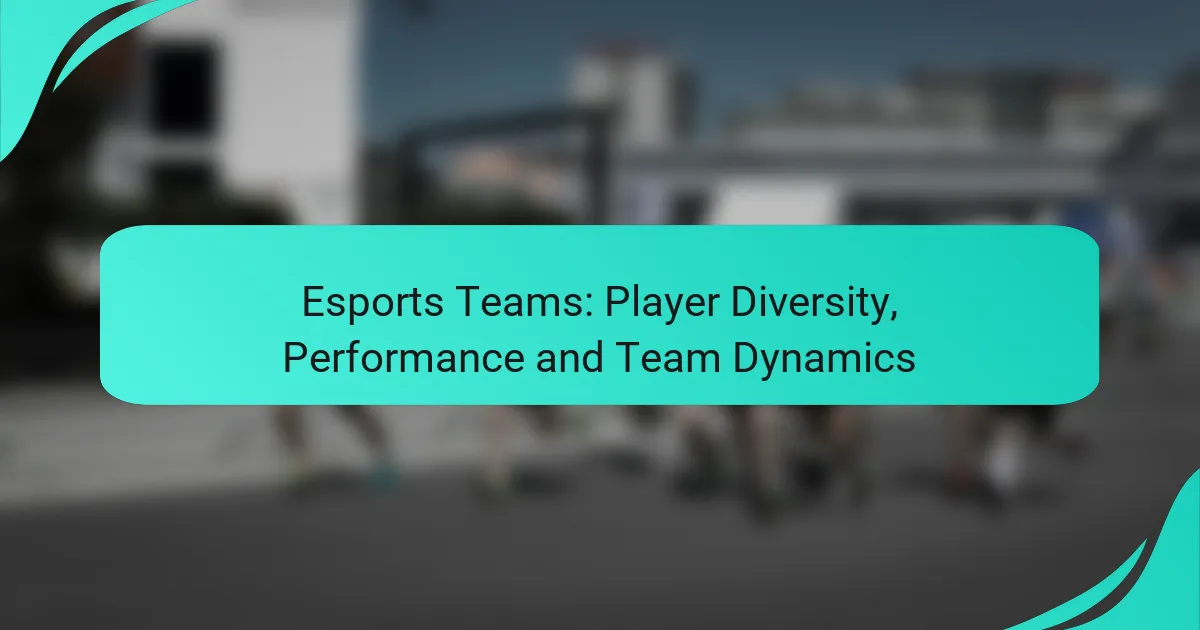In the competitive world of esports, player diversity plays a crucial role in enhancing team performance by bringing together a range of perspectives and strategies. By fostering inclusive practices, teams can not only attract talent from various backgrounds but also create a dynamic environment that promotes effective collaboration and communication. Ultimately, these elements contribute to improved results in competitions and a broader appeal to fans.

How does player diversity impact esports team performance?
Player diversity significantly enhances esports team performance by fostering a variety of perspectives and approaches to gameplay. This diversity can lead to innovative strategies, improved communication, and a wider appeal to fans, ultimately contributing to better results in competitions.
Increased creativity and strategy
Diverse teams bring together players from different backgrounds, each with unique experiences and play styles. This variety encourages creative problem-solving and innovative strategies that can catch opponents off guard. For example, a team with players from various regions may adopt unconventional tactics that leverage their distinct strengths.
Teams can benefit from brainstorming sessions that incorporate diverse viewpoints, leading to more comprehensive game plans. This collaborative approach can result in strategies that are not only effective but also adaptable to different opponents and situations.
Enhanced team communication
Effective communication is crucial in esports, and player diversity can enhance this aspect by introducing varied communication styles. Teams that embrace diverse backgrounds often develop a richer vocabulary and a broader set of non-verbal cues, which can improve in-game coordination. For instance, players from different cultures might use specific phrases or signals that resonate well within the team.
However, it is essential to establish a common language or framework to ensure all team members are on the same page. Regular team-building exercises can help bridge communication gaps and foster a more cohesive unit.
Broader audience appeal
A diverse esports team can attract a wider audience, as fans often connect with players who share similar backgrounds or experiences. This broader appeal can lead to increased viewership and sponsorship opportunities, which are vital for a team’s financial success. For example, a team that includes players from various countries can engage fans from those regions, expanding their fan base significantly.
Moreover, diverse teams can create content that resonates with different demographics, such as streaming in multiple languages or participating in culturally relevant events. This strategy not only enhances visibility but also builds a loyal community around the team.

What are the best practices for fostering diversity in esports teams?
Fostering diversity in esports teams involves implementing inclusive practices that attract and support players from various backgrounds. This can enhance team performance and create a more dynamic gaming environment.
Inclusive recruitment strategies
To build a diverse esports team, organizations should adopt inclusive recruitment strategies that actively seek out players from different demographics. This can include outreach to underrepresented communities through partnerships with gaming organizations, schools, and local clubs.
Employing blind recruitment techniques, where personal information is removed from applications, can help minimize bias. Additionally, using diverse interview panels can ensure a broader perspective in the selection process.
Mentorship programs for underrepresented players
Establishing mentorship programs can significantly support underrepresented players in esports. Pairing experienced players with newcomers can provide guidance, build confidence, and foster a sense of belonging within the team.
These programs should focus on skill development, game strategies, and personal growth. Regular check-ins and feedback sessions can help maintain engagement and ensure that the mentorship is effective and tailored to individual needs.
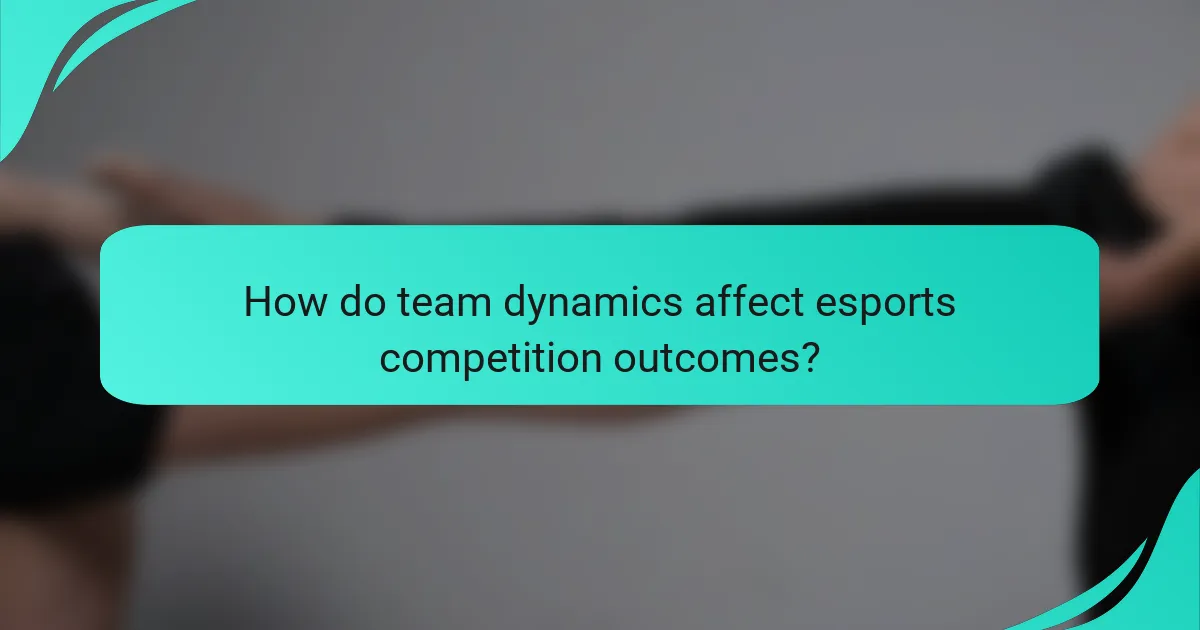
How do team dynamics affect esports competition outcomes?
Team dynamics significantly influence the performance and success of esports teams. Effective collaboration, communication, and conflict resolution among players can lead to improved strategies and better competition results.
Collaboration and synergy among players
Collaboration and synergy are crucial for esports teams to function effectively. When players work together seamlessly, they can develop strategies that leverage each member’s strengths, leading to enhanced overall performance. For instance, a team that communicates well during matches can adapt quickly to opponents’ strategies, increasing their chances of victory.
To foster collaboration, teams should establish clear roles and responsibilities for each player. Regular practice sessions that focus on teamwork can help build trust and understanding among members. Utilizing tools like voice chat and shared screens during gameplay can further enhance coordination.
Conflict resolution strategies
Conflict resolution is essential for maintaining a positive team environment. Disagreements can arise from differing opinions on strategies or performance issues, which, if unresolved, can negatively impact team morale and performance. Implementing structured conflict resolution strategies can help teams navigate these challenges effectively.
One effective approach is to hold regular team meetings where players can voice concerns in a constructive manner. Establishing a culture of open communication encourages players to address issues before they escalate. Additionally, employing a neutral mediator during conflicts can help facilitate discussions and lead to mutually beneficial solutions.

What role does leadership play in esports team success?
Leadership is crucial for esports team success as it shapes team dynamics, influences performance, and fosters a positive environment. Effective leaders guide strategy, motivate players, and facilitate communication, which can significantly enhance overall team cohesion and results.
Effective communication from coaches
Coaches must communicate clearly and consistently to ensure that players understand strategies and expectations. This includes regular feedback sessions, where coaches can address performance issues and celebrate successes. Utilizing various communication tools, such as video analysis and chat platforms, can enhance understanding and engagement among team members.
For example, a coach might hold weekly strategy meetings to discuss upcoming matches, allowing players to voice concerns and contribute ideas. This open dialogue helps build trust and encourages players to take ownership of their roles within the team.
Setting clear goals and expectations
Establishing clear goals and expectations is essential for guiding an esports team towards success. Teams should set both short-term and long-term objectives, such as improving individual skills or achieving specific tournament placements. These goals should be measurable and realistic to maintain motivation and focus.
Additionally, coaches should ensure that each player understands their specific role and responsibilities within the team. This clarity helps prevent misunderstandings and allows players to work collaboratively towards common objectives. Regularly revisiting and adjusting these goals can keep the team aligned and responsive to changing circumstances.
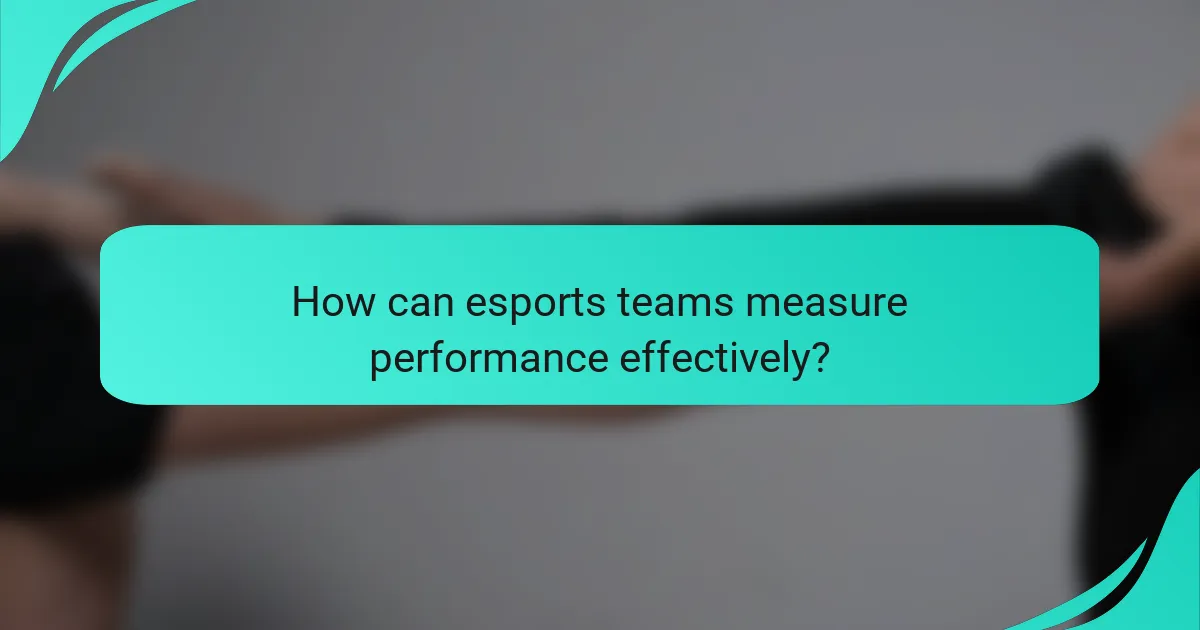
How can esports teams measure performance effectively?
Esports teams can measure performance effectively by utilizing data-driven analytics and regular feedback mechanisms. These methods help teams identify strengths and weaknesses, allowing for targeted improvements in gameplay and strategy.
Utilizing analytics tools like Mobalytics
Analytics tools such as Mobalytics provide in-depth insights into player performance by analyzing gameplay data. These platforms track various metrics, including kill/death ratios, objective control, and team coordination, which are crucial for assessing individual and team effectiveness.
By leveraging these analytics, teams can pinpoint specific areas for improvement. For instance, if a player consistently underperforms in objective control, targeted training sessions can be organized to address this weakness.
Regular performance reviews and feedback
Conducting regular performance reviews is essential for maintaining high standards within esports teams. These reviews should involve both quantitative data from analytics and qualitative feedback from coaches and teammates.
Feedback sessions can be structured to focus on recent matches, discussing what strategies worked and what didn’t. This approach fosters a culture of continuous improvement and accountability, ensuring that players remain aligned with team goals.
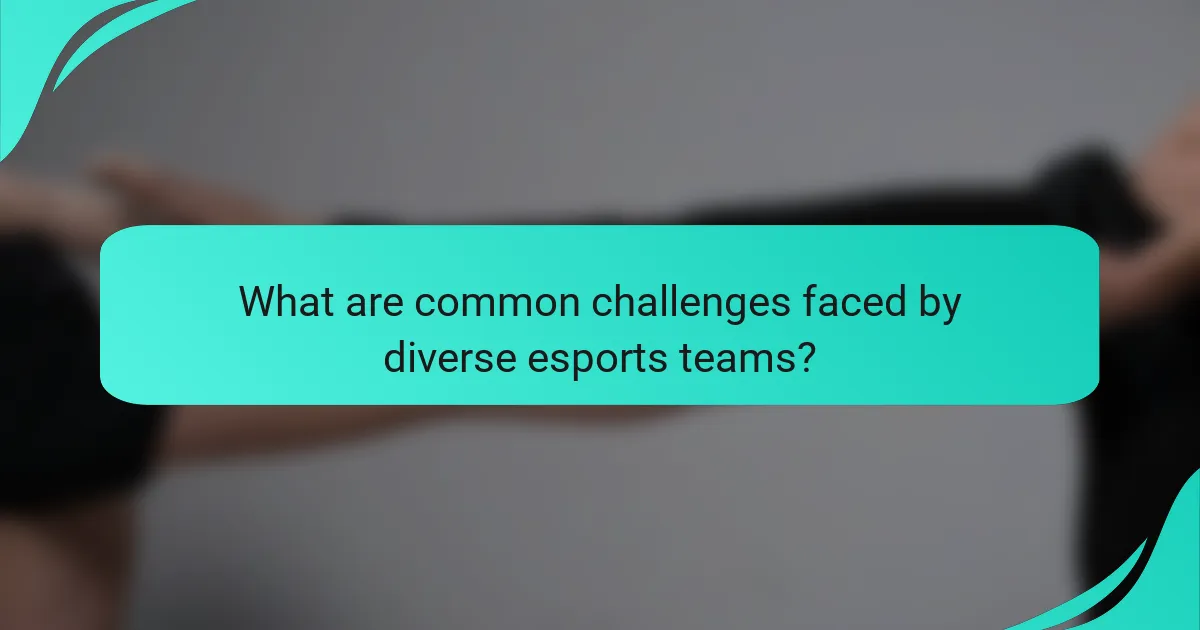
What are common challenges faced by diverse esports teams?
Diverse esports teams often encounter challenges related to communication, cultural misunderstandings, and biases in team dynamics. These issues can affect performance and cohesion, making it essential to address them effectively.
Overcoming cultural differences
Cultural differences can lead to misunderstandings in communication styles, decision-making processes, and conflict resolution. Team members from various backgrounds may interpret cues and feedback differently, which can create friction. To mitigate these challenges, teams should establish clear communication protocols and encourage open dialogue about cultural expectations.
Regular team-building activities that celebrate diversity can foster understanding and respect among players. For example, sharing personal stories or cultural practices can help team members appreciate each other’s backgrounds and build stronger relationships.
Addressing biases in team selection
Biases in team selection can hinder the formation of diverse esports teams, often favoring players from similar backgrounds or experiences. This can limit the potential for varied strategies and perspectives that enhance team performance. To combat this, organizations should implement blind recruitment processes and standardized evaluation criteria that focus on skills and potential rather than personal characteristics.
Additionally, conducting training sessions on unconscious bias for coaches and team managers can help raise awareness and promote fairer selection practices. Establishing diversity goals and regularly reviewing team composition can also ensure that diverse talent is recognized and valued within the team structure.
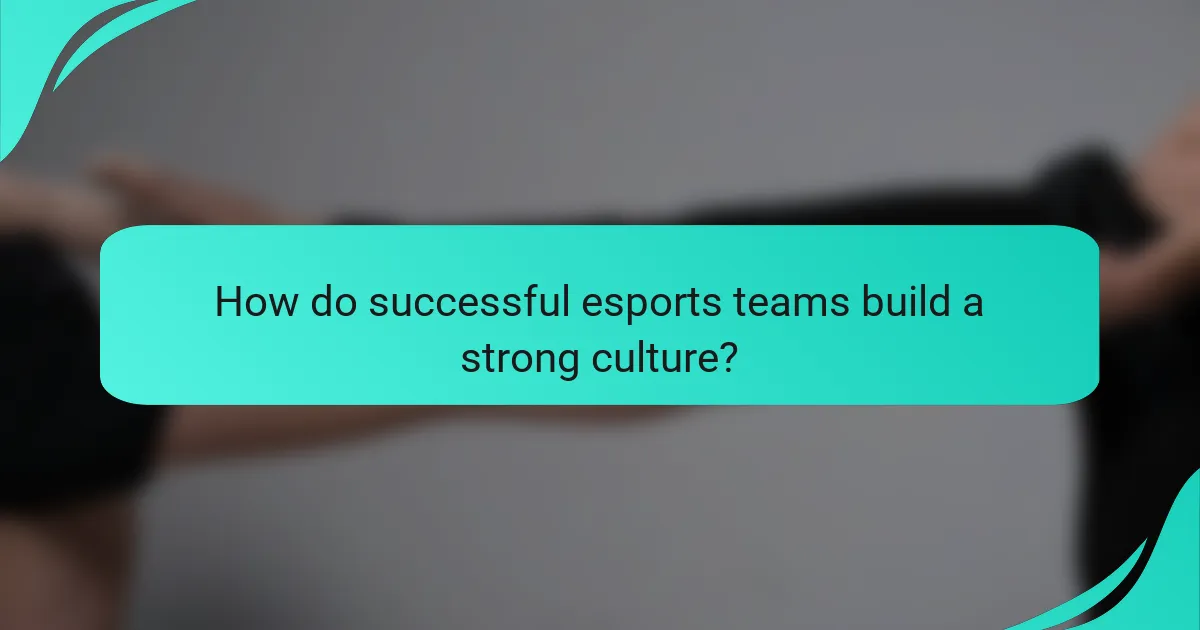
How do successful esports teams build a strong culture?
Successful esports teams cultivate a strong culture by prioritizing values such as inclusivity, respect, and open communication. These elements foster a positive environment that enhances team dynamics and overall performance.
Promoting inclusivity and respect
Inclusivity and respect are foundational to a thriving esports team culture. Teams should actively recruit diverse players from various backgrounds, ensuring that everyone feels valued and represented. This diversity can lead to innovative strategies and improved problem-solving during competitions.
To promote respect, teams can establish clear codes of conduct that outline acceptable behaviors and consequences for violations. Regular team-building activities can also help reinforce these values, allowing players to connect on a personal level and build mutual trust.
Encouraging open dialogue
Open dialogue is essential for addressing issues and fostering collaboration within esports teams. Creating a safe space for players to express their thoughts and concerns can lead to better team cohesion and performance. Regular check-ins and feedback sessions can facilitate this communication.
Teams should implement structured feedback mechanisms, such as anonymous surveys or one-on-one meetings, to ensure that all voices are heard. Encouraging players to share their ideas and strategies openly can also lead to more effective teamwork and adaptability in high-pressure situations.

What are the emerging trends in player diversity in esports?
Player diversity in esports is increasingly recognized as a crucial factor influencing team performance and dynamics. Trends show a growing emphasis on inclusivity across gender, ethnicity, and age, which can enhance creativity and strategic thinking within teams.
Gender Diversity
Gender diversity in esports is gaining traction, with more female players entering competitive gaming. Organizations are actively promoting female participation through dedicated tournaments and scholarships, which can lead to a more balanced representation in teams.
For example, initiatives like the Women in Esports movement aim to create opportunities and support networks for female gamers. This shift not only encourages more women to compete but also helps challenge stereotypes within the gaming community.
Ethnic and Cultural Diversity
Ethnic and cultural diversity is becoming more prominent in esports, reflecting the global nature of the gaming community. Teams are increasingly composed of players from various backgrounds, which can foster unique strategies and perspectives.
Organizations are recognizing the value of diverse teams, as they often perform better in international competitions. For instance, teams that include players from different countries can leverage varied playstyles and communication methods, enhancing overall performance.
Age Diversity
Age diversity is another emerging trend, with players ranging from teenagers to adults in their thirties or even forties. This variety brings different experiences and approaches to gameplay, which can be beneficial for team dynamics.
Older players often contribute valuable insights and strategic thinking, while younger players may bring fresh energy and adaptability. Teams that embrace age diversity can create a more well-rounded environment that appeals to a broader audience.
